外研版(2019) 选择性必修第一册 Unit 2 Onwards and Upwards Developing ideas( 24张ppt)
文档属性
| 名称 | 外研版(2019) 选择性必修第一册 Unit 2 Onwards and Upwards Developing ideas( 24张ppt) | 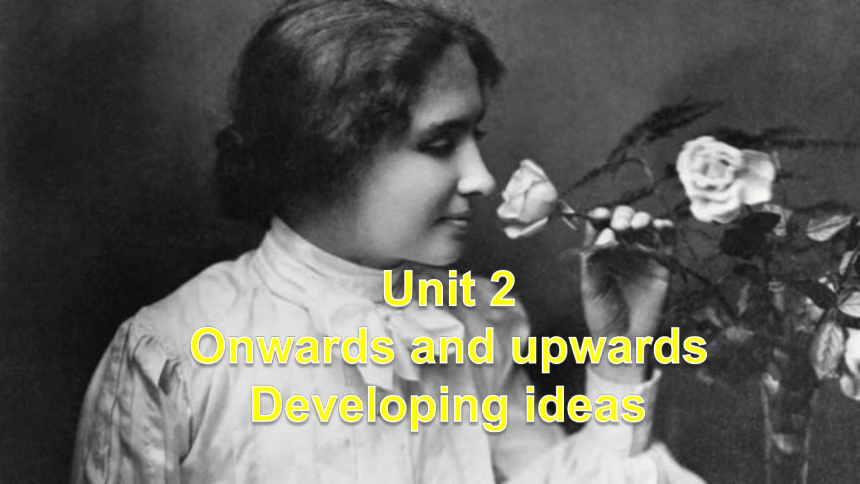 | |
| 格式 | pptx | ||
| 文件大小 | 7.0MB | ||
| 资源类型 | 教案 | ||
| 版本资源 | 外研版(2019) | ||
| 科目 | 英语 | ||
| 更新时间 | 2022-10-25 17:59:52 | ||
图片预览

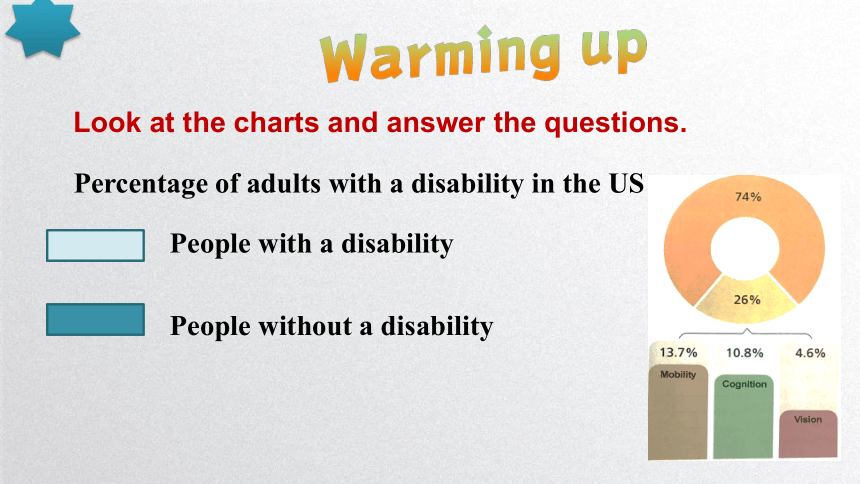
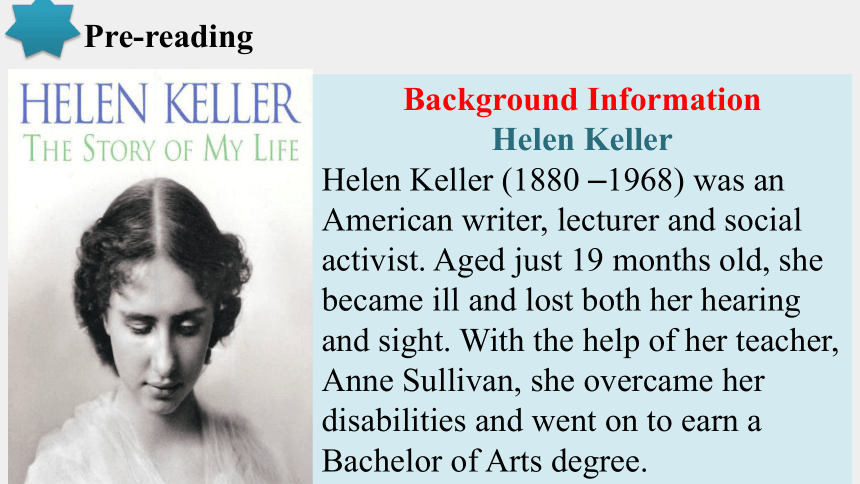
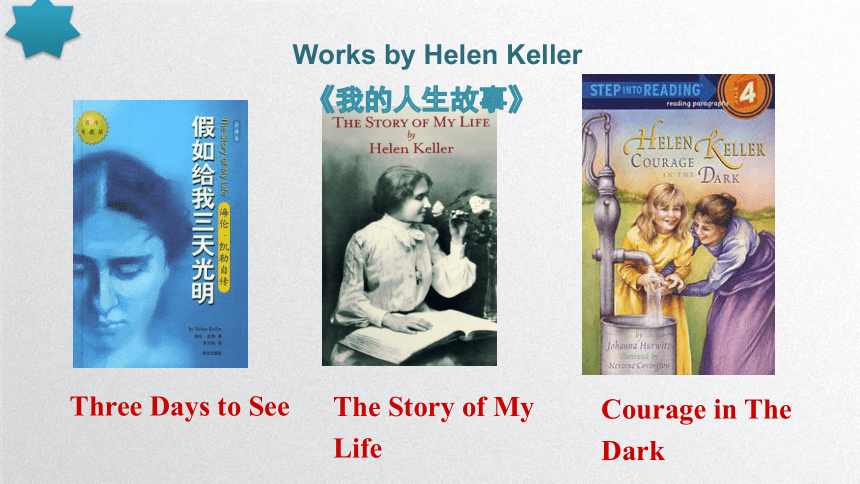
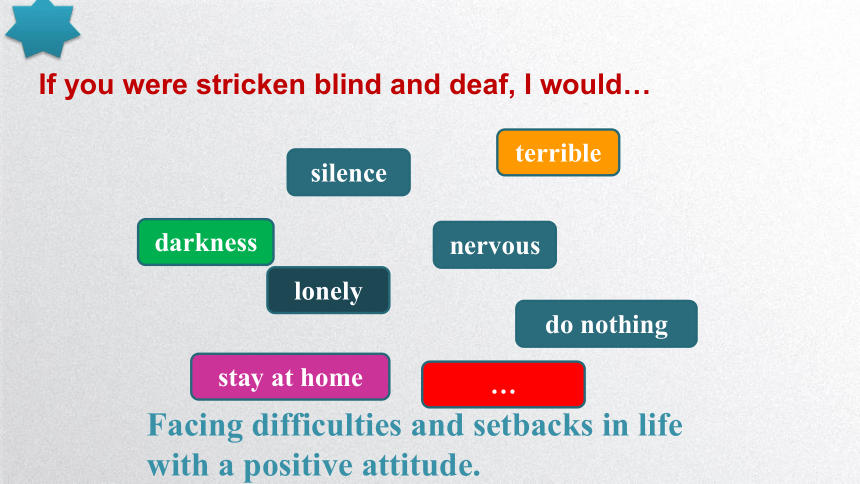
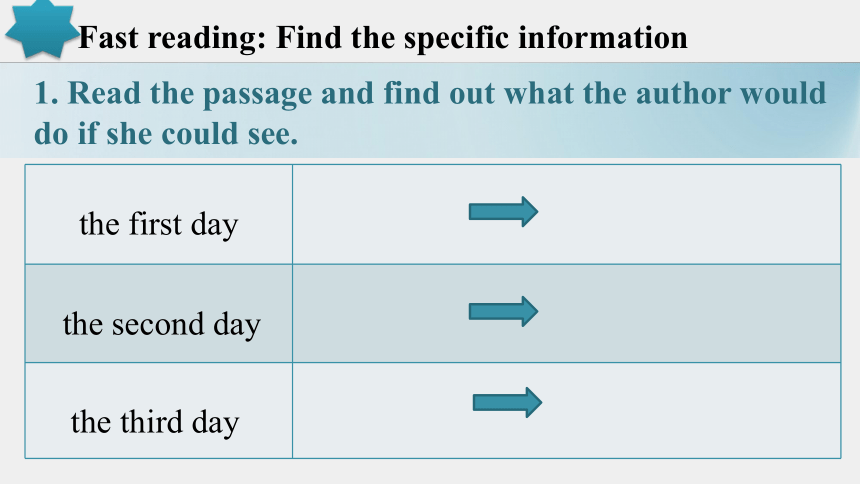
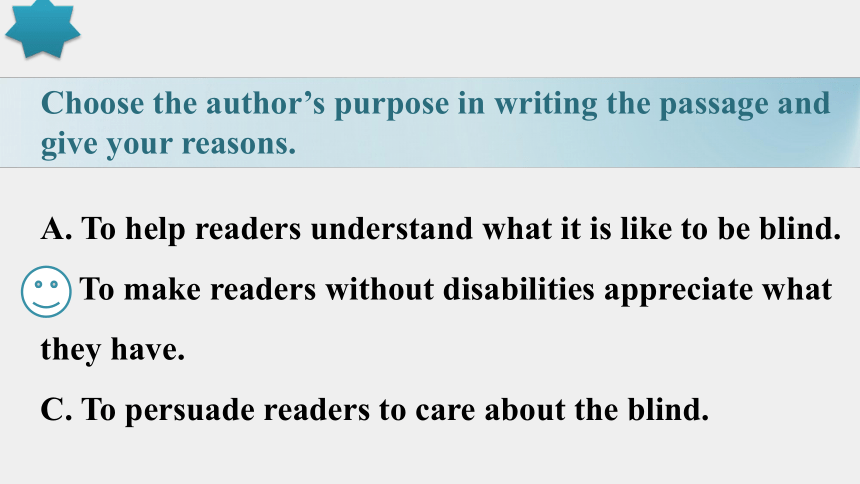
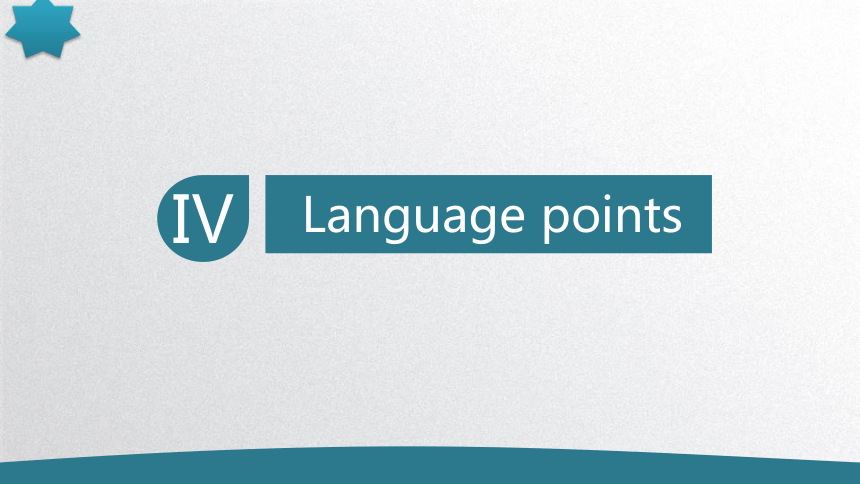
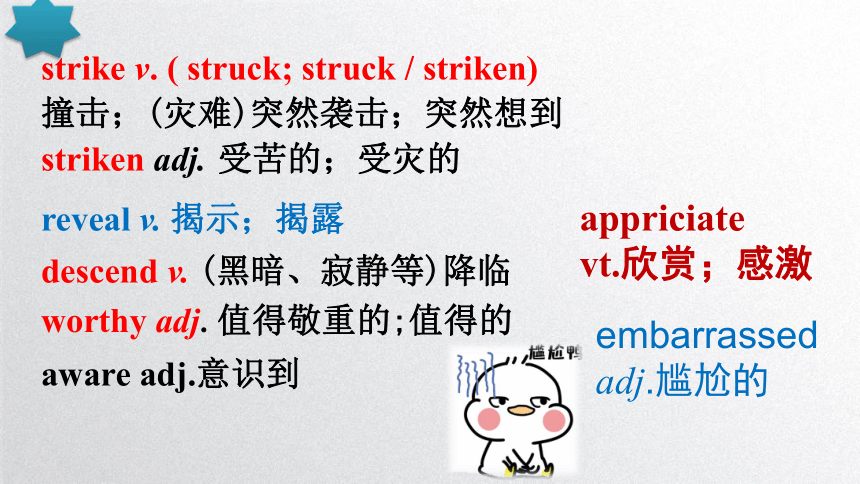
文档简介
(共24张PPT)
Unit 2
Onwards and upwards
Developing ideas
Look at the charts and answer the questions.
Percentage of adults with a disability in the US
People with a disability
People without a disability
Pre-reading
Background Information
Helen Keller
Helen Keller (1880 –1968) was an American writer, lecturer and social activist. Aged just 19 months old, she became ill and lost both her hearing and sight. With the help of her teacher, Anne Sullivan, she overcame her disabilities and went on to earn a Bachelor of Arts degree.
Works by Helen Keller
Three Days to See
The Story of My Life
Courage in The Dark
《我的人生故事》
If you were stricken blind and deaf, I would…
darkness
lonely
silence
nervous
do nothing
terrible
stay at home
…
Facing difficulties and setbacks in life with a positive attitude.
1. Read the passage and find out what the author would do if she could see.
Fast reading: Find the specific information
the first day
the second day
the third day
Choose the author’s purpose in writing the passage and give your reasons.
A. To help readers understand what it is like to be blind.
B. To make readers without disabilities appreciate what they have.
C. To persuade readers to care about the blind.
Language points
Ⅳ
strike v. ( struck; struck / striken)
撞击;(灾难)突然袭击;突然想到
striken adj. 受苦的;受灾的
reveal v. 揭示;揭露
descend v. (黑暗、寂静等)降临
worthy adj.值得敬重的;值得的
aware adj.意识到
appriciate
vt.欣赏;感激
embarrassed adj.尴尬的
Language points: Important words
1. strike v ( struck; struck / striken)
The ship struck a rock.
撞击;击;打
striken adj 受灾的;患病的;受苦的
Last month, part of Southeast Asia was struck by floods.
It struck me that we might have made the wrong decision.
(灾难)突然袭击
突然想到;意识到
Language points: Important words
2. reveal v 揭示;揭露;泄露
He did not reveal his secret plan to us.
I should be glad to help you if you reveal your
thoughts to me.
他没有向我们透露他的秘密计划。
如果你把你的想法告诉我,我会很乐意帮你的。
Language points: Important words
3. descend v (黑暗、寂静等突然)降临;(感情等突然)来袭
常见搭配:descend on / upon 降临;突然到达
Total silence descended on the room.
房间里突然一片寂静。
Language points: Important sentences
4.worthy adj
1)[用于名词前] 值得敬重的,有价值的
a worthy man 高尚的人
worthy of note 值得注意
2)[用作表语] 值得的
be worthy of sth / being done(接动名词用被动语态)
be worthy to be done 值得做
The city is so beautiful that it is worthy of a second visit.
= The city is so beautiful that it is worthy of being visited a second time.
The work is worthy to be mentioned.
1. be aware of __________________
2. now and then __________________
3. in particular __________________
4. be worthy of __________________
5. ups and downs __________________
6. be able to do sth __________________
意识到
时常;偶尔
特别地;尤其地
值得......的
起起伏伏
能够做某事
7. apply to ______________________
8. care about ______________________
9. interact with ______________________
适用于
关心;担心
和……交流;和……互动
1. Only when darkness had again descended upon me should I realize how much I had left unseen.
Language points: Important sentences
Paraphrase: Only when darkness returned to me again, would I realize how much I had been able to see.
注意:本句是一个倒装句,强调时间状语。
翻译:唯有在黑暗再次来袭时,我才意识到我还有那么多事
情没有看到。
1) Only then did I realize the importance of study.
2) Only when the war was over in 1918 was he able to get happily back to work.
翻译:只有用这种方式,你才能在英语上取得巨大进步。
Language points: Important sentences
当副词only及其修饰的状语放在句首时,主句通常用半倒装结构。
Only by this means can you make great progress in English.
2. I have often thought it would be a blessing if each human being were stricken blind and deaf for a few days at some time during his early adult life.
翻译:我经常想,如果每个人在年轻的时候都有几天失明失聪,也不失为一件幸事。
注意:本句使用了虚拟语气,对未发生的事情进行假设。
Language points: Important sentences
虚拟语气表示说话人所说的话不是事实,而是一种不能实现的假设或愿望,或在说话人看来实现的可能性很小的情况。虚拟语气主要用于if引导的条件状语从句中。
本句使用了虚拟语气,对未能发生的事情进行假设。
3.And I have imagined what I should most like to see if I were given the use of my eyes, say for just three days.
翻译:我想象过,如果我能恢复视觉,比如只有三天,
我最希望看到什么?
虚拟语气在 if 条件句中的用法
Language points: Important sentences
If 从句的谓语形式 主句的谓语形式
与现在事实 相反 did / were should / would /
could / might + do
与过去事实 相反 had + done should / would /
could / might + have done
与将来事实 可能相反 did / were should + do were to + do should / would /
could / might + do
1) 如果我是你,我就抓住这次出国的机会。
2) 如果你早一点起床,就会赶上火车的。
3) 如果今天晚上下雪的话,我就不出去了。
If you had got up earlier, you could have caught the train.
If it were to snow this evening, I would not go out.
If I were you, I would seize the chance to go abroad.
Fast reading: Find the specific information
the first day
On the first day, she would want to see the kind people who have helped her and accompanied her through life. Then she would like to see the books which have opened her mind. In the afternoon, she would take a long walk in the woods and appreciate the beauty of nature.
Fast reading: Find the specific information
the second day
On the second day, she would like to see a display of the progress of civilisation. She would go to the museums and spend the evening at a theater or at the movies.
Fast reading: Find the specific information
the third day
On the third day, she would again greet the dawn, anxious to discover new delights, new revelations of beauty. She would spend the third
day observing people in their day-to-day life.
Unit 2
Onwards and upwards
Developing ideas
Look at the charts and answer the questions.
Percentage of adults with a disability in the US
People with a disability
People without a disability
Pre-reading
Background Information
Helen Keller
Helen Keller (1880 –1968) was an American writer, lecturer and social activist. Aged just 19 months old, she became ill and lost both her hearing and sight. With the help of her teacher, Anne Sullivan, she overcame her disabilities and went on to earn a Bachelor of Arts degree.
Works by Helen Keller
Three Days to See
The Story of My Life
Courage in The Dark
《我的人生故事》
If you were stricken blind and deaf, I would…
darkness
lonely
silence
nervous
do nothing
terrible
stay at home
…
Facing difficulties and setbacks in life with a positive attitude.
1. Read the passage and find out what the author would do if she could see.
Fast reading: Find the specific information
the first day
the second day
the third day
Choose the author’s purpose in writing the passage and give your reasons.
A. To help readers understand what it is like to be blind.
B. To make readers without disabilities appreciate what they have.
C. To persuade readers to care about the blind.
Language points
Ⅳ
strike v. ( struck; struck / striken)
撞击;(灾难)突然袭击;突然想到
striken adj. 受苦的;受灾的
reveal v. 揭示;揭露
descend v. (黑暗、寂静等)降临
worthy adj.值得敬重的;值得的
aware adj.意识到
appriciate
vt.欣赏;感激
embarrassed adj.尴尬的
Language points: Important words
1. strike v ( struck; struck / striken)
The ship struck a rock.
撞击;击;打
striken adj 受灾的;患病的;受苦的
Last month, part of Southeast Asia was struck by floods.
It struck me that we might have made the wrong decision.
(灾难)突然袭击
突然想到;意识到
Language points: Important words
2. reveal v 揭示;揭露;泄露
He did not reveal his secret plan to us.
I should be glad to help you if you reveal your
thoughts to me.
他没有向我们透露他的秘密计划。
如果你把你的想法告诉我,我会很乐意帮你的。
Language points: Important words
3. descend v (黑暗、寂静等突然)降临;(感情等突然)来袭
常见搭配:descend on / upon 降临;突然到达
Total silence descended on the room.
房间里突然一片寂静。
Language points: Important sentences
4.worthy adj
1)[用于名词前] 值得敬重的,有价值的
a worthy man 高尚的人
worthy of note 值得注意
2)[用作表语] 值得的
be worthy of sth / being done(接动名词用被动语态)
be worthy to be done 值得做
The city is so beautiful that it is worthy of a second visit.
= The city is so beautiful that it is worthy of being visited a second time.
The work is worthy to be mentioned.
1. be aware of __________________
2. now and then __________________
3. in particular __________________
4. be worthy of __________________
5. ups and downs __________________
6. be able to do sth __________________
意识到
时常;偶尔
特别地;尤其地
值得......的
起起伏伏
能够做某事
7. apply to ______________________
8. care about ______________________
9. interact with ______________________
适用于
关心;担心
和……交流;和……互动
1. Only when darkness had again descended upon me should I realize how much I had left unseen.
Language points: Important sentences
Paraphrase: Only when darkness returned to me again, would I realize how much I had been able to see.
注意:本句是一个倒装句,强调时间状语。
翻译:唯有在黑暗再次来袭时,我才意识到我还有那么多事
情没有看到。
1) Only then did I realize the importance of study.
2) Only when the war was over in 1918 was he able to get happily back to work.
翻译:只有用这种方式,你才能在英语上取得巨大进步。
Language points: Important sentences
当副词only及其修饰的状语放在句首时,主句通常用半倒装结构。
Only by this means can you make great progress in English.
2. I have often thought it would be a blessing if each human being were stricken blind and deaf for a few days at some time during his early adult life.
翻译:我经常想,如果每个人在年轻的时候都有几天失明失聪,也不失为一件幸事。
注意:本句使用了虚拟语气,对未发生的事情进行假设。
Language points: Important sentences
虚拟语气表示说话人所说的话不是事实,而是一种不能实现的假设或愿望,或在说话人看来实现的可能性很小的情况。虚拟语气主要用于if引导的条件状语从句中。
本句使用了虚拟语气,对未能发生的事情进行假设。
3.And I have imagined what I should most like to see if I were given the use of my eyes, say for just three days.
翻译:我想象过,如果我能恢复视觉,比如只有三天,
我最希望看到什么?
虚拟语气在 if 条件句中的用法
Language points: Important sentences
If 从句的谓语形式 主句的谓语形式
与现在事实 相反 did / were should / would /
could / might + do
与过去事实 相反 had + done should / would /
could / might + have done
与将来事实 可能相反 did / were should + do were to + do should / would /
could / might + do
1) 如果我是你,我就抓住这次出国的机会。
2) 如果你早一点起床,就会赶上火车的。
3) 如果今天晚上下雪的话,我就不出去了。
If you had got up earlier, you could have caught the train.
If it were to snow this evening, I would not go out.
If I were you, I would seize the chance to go abroad.
Fast reading: Find the specific information
the first day
On the first day, she would want to see the kind people who have helped her and accompanied her through life. Then she would like to see the books which have opened her mind. In the afternoon, she would take a long walk in the woods and appreciate the beauty of nature.
Fast reading: Find the specific information
the second day
On the second day, she would like to see a display of the progress of civilisation. She would go to the museums and spend the evening at a theater or at the movies.
Fast reading: Find the specific information
the third day
On the third day, she would again greet the dawn, anxious to discover new delights, new revelations of beauty. She would spend the third
day observing people in their day-to-day life.
